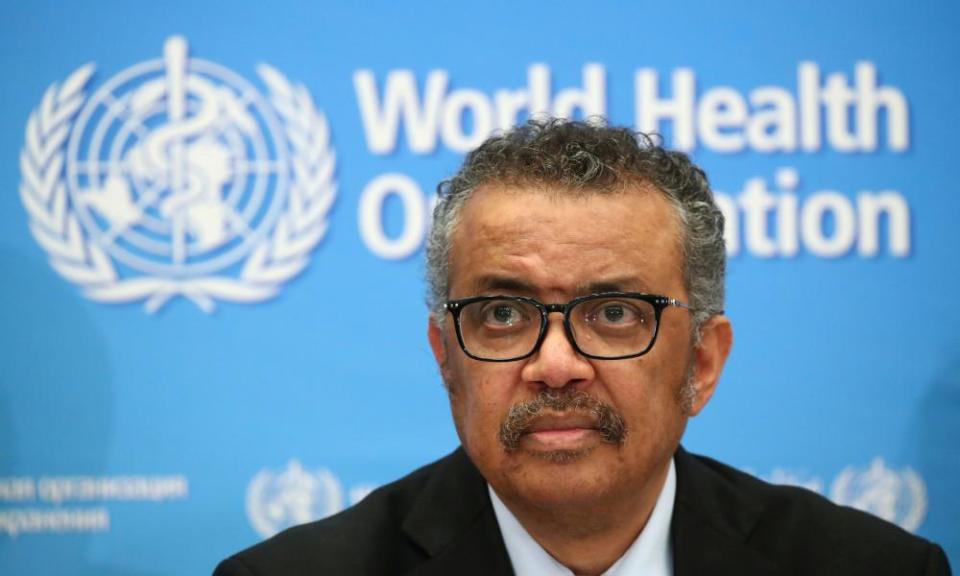Covid-19 pandemic accelerating says WHO as review panel named

Covid-19 outbreaks are not under control in most countries and the pandemic is still accelerating globally, with infections doubling in the past six weeks, the head of the World Health Organization has warned.
Dr Tedros Adhanom Ghebreyesus’s bleak assessment of the trajectory of the coronavirus pandemic came as he announced that the UN body was setting up an independent panel to review its response and that of governments, and as confirmed cases worldwide approached 12m.
“We know that when countries take a comprehensive approach based on fundamental public health measures … the Covid-19 outbreak can be brought under control,” Tedros said. “But in most of the world, the virus is not under control. It is getting worse … more than 544,000 lives have been lost. The pandemic is still accelerating. The total number of cases has doubled in the last six weeks.”
On Tuesday, the Trump administration gave a formal one-year notice of its intent to withdraw the US from the WHO. The move followed months of sniping by Donald Trump and his senior officials, who are themselves under fire for their botched handling of the outbreak in the US.
The US is the WHO’s biggest donor, contributing $400m (£315m) to $500m annually. Trump has accused the body of mishandling the pandemic and of being a “puppet” of China.
Although Tedros did not refer to the US decision, he did criticise the shortcomings exposed by the international response to the pandemic, in comments that could be interpreted as critical of Trump’s “America first” agenda.
“The greatest threat we face now is not the virus itself,” he said. “Rather, it’s the lack of leadership and solidarity at the global and national level. We cannot defeat this pandemic as a divided world. The virus thrives on division but is thwarted when we unite.”
The review panel will be co-chaired by Helen Clark, a former prime minister of New Zealand, and Ellen Johnson Sirleaf, the Nobel peace prize laureate and former president of Liberia.
default
Describing the pandemic as a “decisive moment in recent history”, Tedros said it had “taken the world hostage” as he lamented the inability of global community to unite around a common response.
“How is it difficult for humans to unite to fight a common enemy that’s killing people indiscriminately?” he said. “Together is the solution, unless we want to give the advantage the enemy, to the virus that has taken the world hostage – and this has to stop.”
While the review is unlikely to help with the WHO’s tensions with the Trump administration, it may be greeted more positively in places such as the EU, which sponsored calls in May for an investigation into the handling of the outbreak.
The Guardian understands that the decision to announce the review on Thursday, which was mandated by May’s virtual global health assembly, was taken before the WHO received a letter from the US secretary of state, Mike Pompeo, this week formally notifying the US intention to quit the body.
Sources in the global health community nevertheless suggested that the WHO’s decision to hold a review in the middle of the pandemic rather than afterwards was prompted in part by the Trump administration’s treatment of the WHO as a “punchbag” over its interactions with China at the outset of the outbreak.
Tedros said the WHO would be “an open book” to the investigatory panel and called on other member states to treat the review in the same way.
The new panel will give a monthly briefing on its progress and present an interim report to the next world health assembly gathering in November.
Sirleaf said: “I look forward to doing all we can to respond to these challenges that have prevented us from being united in moving forward, not only to address the effects of Covid-19 but to ensure a better health system for all nations of the world.”
Clark added: “This assignment could only be described as exceptionally challenging.”

 Yahoo Movies
Yahoo Movies 